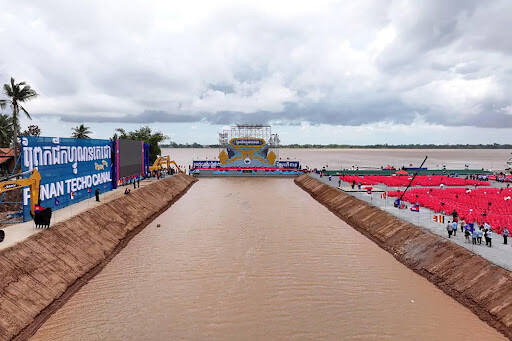
Phnom Penh, Cambodia – In a move that has significant economic and geopolitical implications, China has pledged to invest $1.2 billion in the construction of the Funan Techo Canal, a transformative waterway project in Cambodia. The agreement was formalized during a visit by Chinese President Xi Jinping to Phnom Penh, signaling Beijing's deepening economic and strategic engagement in the Southeast Asian nation.
The ambitious project, long envisioned by Cambodia, aims to create a 180-kilometer inland and maritime route connecting the capital city of Phnom Penh to the Gulf of Thailand, traversing through the southern province of Kep. Utilizing existing tributaries of the Mekong River, the canal is designed to accommodate vessels with a deadweight tonnage of up to 3,000, opening up new avenues for trade and transportation.
According to the Cambodian government, the agreement with China Communications Construction Company (CCCC), through its subsidiary China Road and Bridge Corporation (CRBC), encompasses not only the excavation of the canal but also the development of crucial infrastructure such as ship locks, navigation aids, and logistics facilities. Wang Tongzhou, Chairman of CCCC, hailed the project as a "new engine for national economic growth" for Cambodia, anticipating a substantial reduction in logistics costs and a catalyst for the country's industrial advancement.
The Funan Techo Canal is a project of considerable scale, with an estimated total cost of $1.7 billion, representing a significant portion of Cambodia's national GDP. While initial construction commenced in August of the previous year, the project had reportedly stalled due to financial constraints. China's substantial investment effectively revitalizes this crucial infrastructure endeavor for Cambodia. The financing structure is a public-private partnership, with Cambodian entities holding a majority 51% stake and Chinese investors controlling the remaining 49%. The CRBC will operate the canal under a Build-Operate-Transfer (BOT) model for an initial period of 40 to 50 years before transferring ownership to the Cambodian government. The Cambodian government optimistically projects the creation of up to 50,000 direct and indirect jobs as a result of the canal's construction and operation.
However, the project has ignited significant concerns in neighboring Vietnam and among environmental advocacy groups. Vietnam has voiced apprehension over the potential impact on the Mekong River's water flow, a vital resource for the country's agricultural heartland and the Mekong Delta region. Hanoi fears that the canal could exacerbate water scarcity during the dry season and increase the risk of flooding during the wet season, impacting agricultural productivity and livelihoods. Environmentalists echo these concerns, warning of potential disruptions to the Mekong's delicate ecosystem and the potential loss of biodiversity due to altered water levels and flow patterns. The Mekong River basin is one of the world's most biodiverse regions, and any significant alteration to its hydrology could have far-reaching ecological consequences.
Adding a layer of geopolitical complexity, both Vietnam and the United States have expressed concerns that the Funan Techo Canal could serve a dual purpose, potentially facilitating the movement of Chinese naval vessels into the Gulf of Thailand. This apprehension stems from China's growing military presence and assertiveness in the South China Sea and the potential for the canal to provide Beijing with a strategic advantage in the region. The Gulf of Thailand is a critical waterway, and any perceived increase in Chinese naval access could be viewed as a challenge to the existing regional power balance.
Despite these regional anxieties, Cambodian Prime Minister Hun Manet has remained resolute in his commitment to the project. He has publicly stated that the canal will be built "at any cost," emphasizing its importance for Cambodia's "national prestige, territorial integrity, and development." This unwavering stance underscores the Cambodian government's belief in the economic benefits and strategic importance of the Funan Techo Canal.
The financing agreement with China underscores the deepening economic ties between Beijing and Phnom Penh. Cambodia has become an increasingly important partner for China within Southeast Asia, aligning closely with Beijing's Belt and Road Initiative. This investment in the Funan Techo Canal further solidifies this relationship, providing Cambodia with much-needed infrastructure development while expanding China's influence in the region.
The long-term economic benefits for Cambodia are potentially substantial. The canal could significantly reduce transportation costs and travel times for goods moving between Phnom Penh and international markets accessed via the Gulf of Thailand. Currently, goods are primarily transported by road or via the Mekong River through Vietnam to reach seaports, a process that can be time-consuming and expensive. The new canal would offer a direct and potentially more efficient route, boosting Cambodia's trade competitiveness and attracting further investment. The Cambodian government envisions the canal as a catalyst for industrial development, enabling the country to move towards higher-value-added manufacturing and exports.
However, the environmental and geopolitical risks associated with the project cannot be ignored. The concerns raised by Vietnam regarding water management in the Mekong basin are particularly pertinent, given the river's critical role in the livelihoods and economies of multiple Southeast Asian nations. Ensuring transparent environmental impact assessments and fostering regional cooperation in water resource management will be crucial to mitigating potential negative consequences.
The strategic implications of the canal are also significant. The United States, in particular, has been closely monitoring China's growing influence in Cambodia, especially its access to Ream Naval Base on the Gulf of Thailand. The potential for the Funan Techo Canal to enhance China's naval reach in the region adds another layer of complexity to the geopolitical landscape of Southeast Asia.
As construction moves forward, likely propelled by China's significant financial backing, the Funan Techo Canal will be a project to watch closely. Its economic impact on Cambodia, its environmental consequences for the Mekong region, and its strategic implications for the broader Southeast Asian landscape will undoubtedly be subjects of ongoing debate and analysis. The Cambodian government's determination to see this project through, coupled with China's willingness to invest, sets the stage for a transformative development with potentially far-reaching consequences.
[Copyright (c) Global Economic Times. All Rights Reserved.]






























